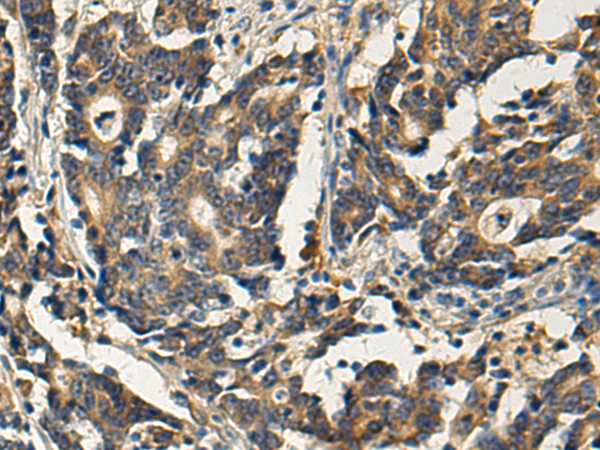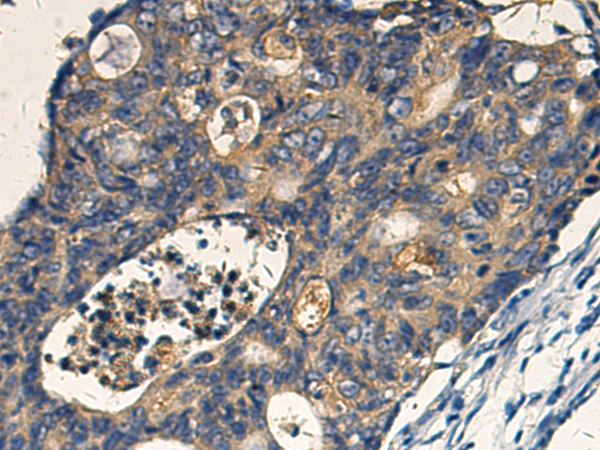

| WB | 咨询技术 | Human,Mouse,Rat |
| IF | 咨询技术 | Human,Mouse,Rat |
| IHC | 1/200-1/300 | Human,Mouse,Rat |
| ICC | 技术咨询 | Human,Mouse,Rat |
| FCM | 咨询技术 | Human,Mouse,Rat |
| Elisa | 1/5000-1/10000 | Human,Mouse,Rat |
| Aliases | PE; HPS; HPS2; ADTB3; ADTB3A |
| Host/Isotype | Rabbit IgG |
| Antibody Type | Primary antibody |
| Storage | Store at 4°C short term. Aliquot and store at -20°C long term. Avoid freeze/thaw cycles. |
| Species Reactivity | Human, Mouse, Rat |
| Immunogen | Fusion protein of human AP3B1 |
| Formulation | Purified antibody in PBS with 0.05% sodium azide and 50% glycerol. |
+ +
以下是关于AP3B1抗体的部分参考文献示例(仅供参考,建议通过学术数据库核实具体信息):
---
1. **文献名称**:*Role of the AP-3 adaptor complex in synaptic vesicle formation*
**作者**:Faúndez, V., et al.
**摘要**:研究AP-3复合体(含AP3B1亚基)在神经元突触小泡生成中的作用,通过免疫荧光和抗体标记揭示AP3B1在胞内运输中的定位及功能缺陷对神经分泌的影响。
2. **文献名称**:*Mutations in AP3B1 associated with Hermansky-Pudlak syndrome type 2*
**作者**:Huizing, M., et al.
**摘要**:分析赫曼斯基-普德拉克综合征2型患者的AP3B1基因突变,使用特异性抗体进行Western blot和免疫组化,证实突变导致AP-3复合体功能异常及溶酶体相关细胞器缺陷。
3. **文献名称**:*Characterization of the adaptor-related protein complex 3 (AP-3) in platelets*
**作者**:Clark, R.H., et al.
**摘要**:利用AP3B1抗体研究AP-3复合体在血小板致密颗粒形成中的作用,发现AP3B1缺失导致血小板储存池缺陷及出血倾向。
4. **文献名称**:*AP-3 mediates cargo sorting to lysosome-related organelles*
**作者**:Dell'Angelica, E.C., et al.
**摘要**:通过抗体阻断和敲除实验,证明AP3B1作为AP-3复合体关键亚基,参与黑素体和溶酶体相关细胞器的蛋白质分选及运输机制。
---
**注意**:以上文献信息为示例,实际引用时请通过PubMed、Web of Science等平台核对准确性,并补充年份、期刊及卷页等完整信息。
AP3B1 antibody targets the β3A subunit of the Adaptor Protein complex 3 (AP-3), a heterotetrameric complex involved in intracellular vesicle formation and cargo sorting. AP-3 facilitates protein trafficking from the Golgi apparatus and endosomes to lysosomes, lysosome-related organelles (LROs), and melanosomes. The AP3B1 gene encodes the β3A subunit, which is critical for the complex’s stability and function. Mutations in AP3B1 are linked to Hermansky-Pudlak syndrome type 2 (HPS2), a rare autosomal recessive disorder characterized by oculocutaneous albinism, platelet dysfunction, and immunodeficiency due to defects in LRO biogenesis.
AP3B1 antibodies are essential tools for studying AP-3 complex localization, expression levels, and interactions. They are widely used in techniques like Western blotting, immunofluorescence, and immunoprecipitation to investigate AP-3’s role in membrane trafficking, organelle maturation, and disease mechanisms. In research, these antibodies help elucidate how AP3B1 dysfunction disrupts lysosomal enzyme transport, melanin synthesis, or immune cell cytotoxicity. Commercially available AP3B1 antibodies are typically validated in human, mouse, or rat samples, with applications spanning basic cell biology, clinical diagnostics, and therapeutic development for HPS2 or related lysosomal disorders. Proper controls, such as knockout cell lines, are recommended to confirm antibody specificity due to potential cross-reactivity with other adaptor protein subunits.
×